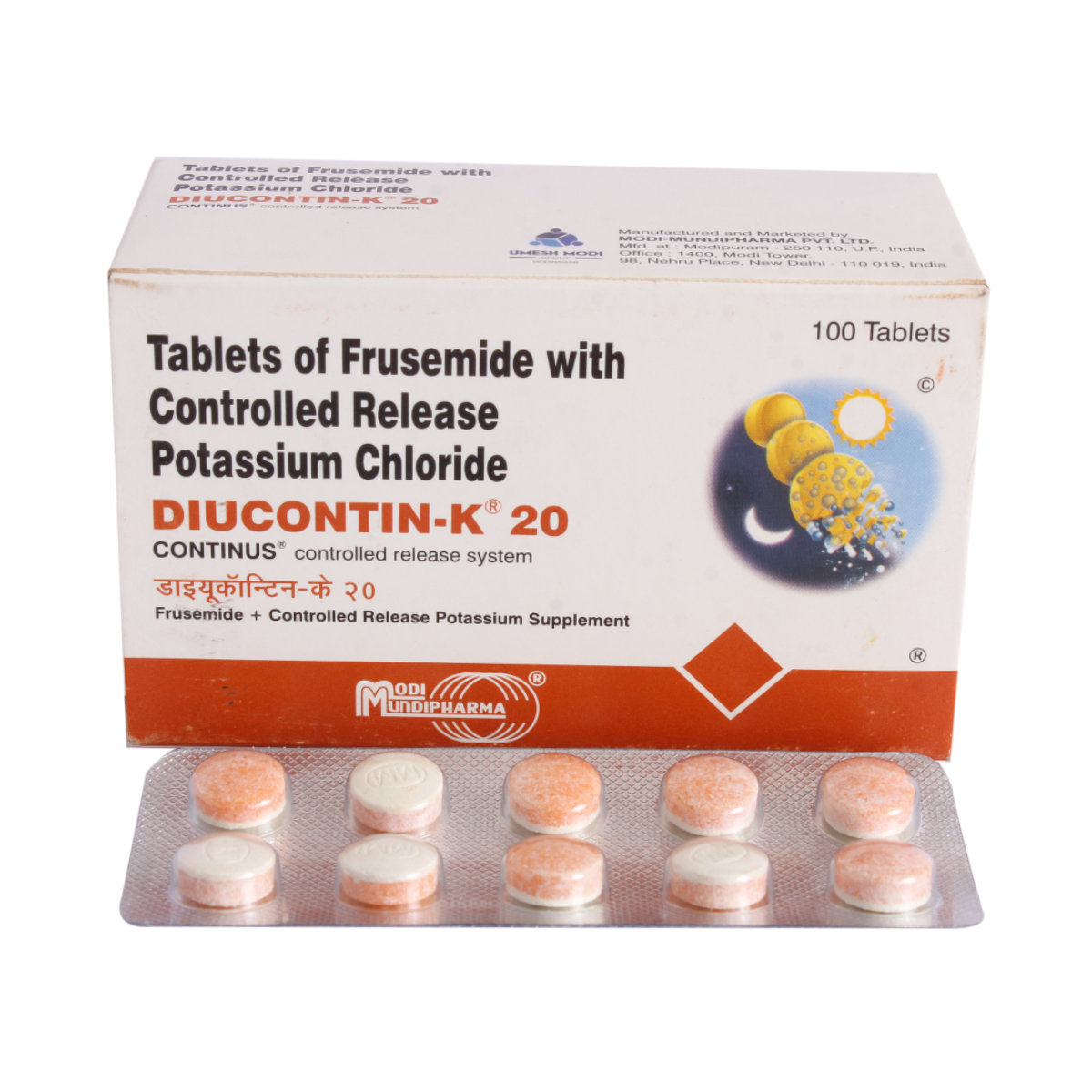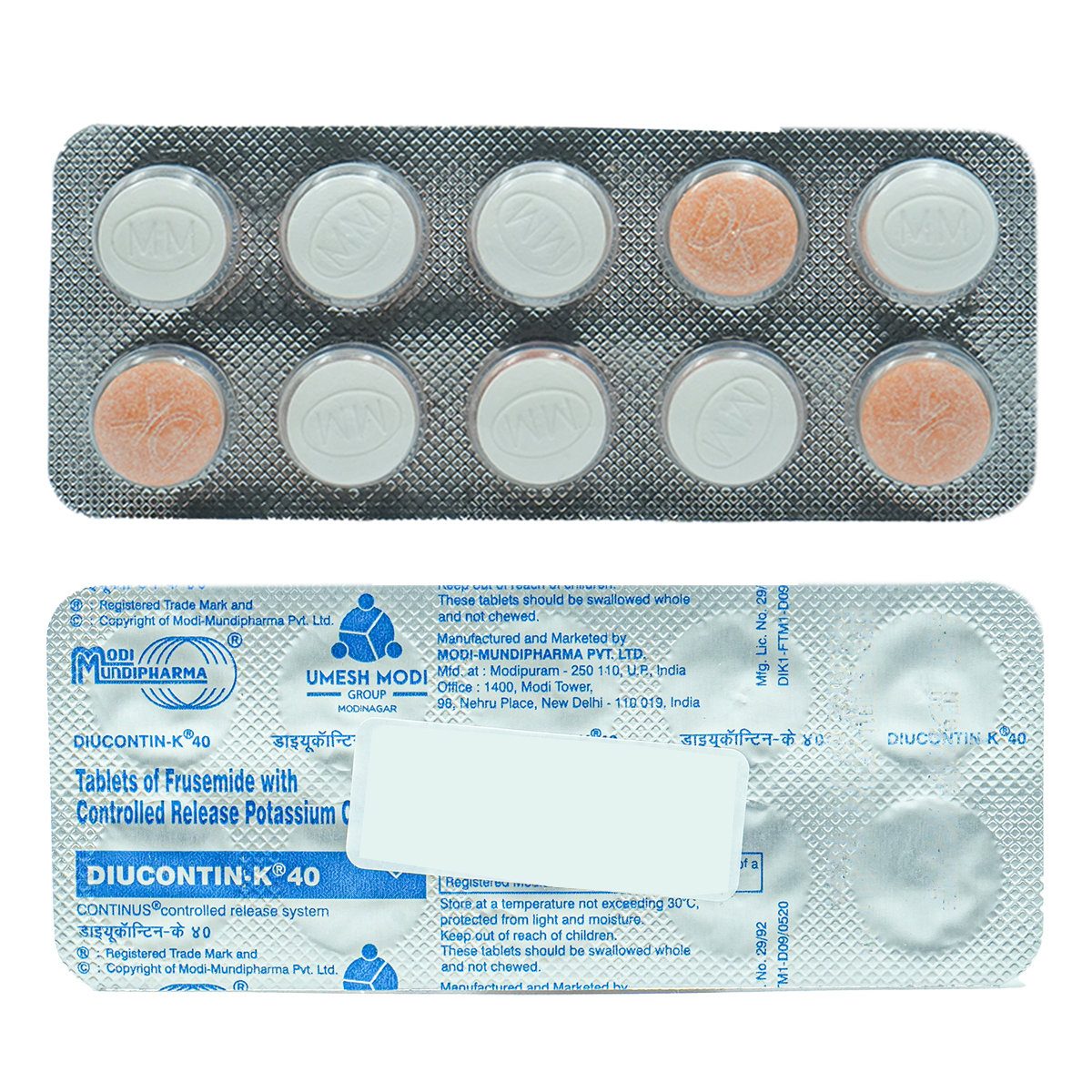Furosemide+potassium Chloride
About Furosemide+potassium Chloride
Furosemide+potassium Chloride belongs to a group of medicines called diuretics (which increase the production of urine) and is primarily used to treat edema. A condition in which the swelling occurs when too much fluid becomes trapped in the tissues of the body, particularly the skin. Many possible causes of edema include heart failure, kidney failure, liver diseases and also by certain medications.
Furosemide+potassium Chloride contains furosemide and potassium chloride. Furosemide is a diuretic that removes extra water and certain electrolytes from the body by increasing the amount of urine produced. In doing so, it causes potassium loss. Potassium chloride is a mineral supplement added to prevent low levels of potassium in the blood. Thus Furosemide+potassium Chloride improves the fluid overload associated with kidney, liver, heart diseases and also prevents the loss of potassium.
You can take Furosemide+potassium Chloride with food or without food. It should be swallowed whole with a glass of water. Do not chew, bite, or break it. Your doctor will advise you on how often you take your tablets based on your medical condition. In some cases, you may experience nausea, vomiting, diarrhoea, flatulence, stomach pain, and dehydration. Most of these side effects of Furosemide+potassium Chloride do not require medical attention and gradually resolve over time. However, if the side effects are persistent, reach out to your doctor.
Inform your doctor before stopping the Furosemide+potassium Chloride. Inform your doctor if you are suffering from any kidney or liver or heart disease. If you are pregnant or breastfeeding, please tell your doctor so that the dosage of Furosemide+potassium Chloride can be prescribed accordingly. Please tell your doctor if you had an allergic reaction to Furosemide+potassium Chloride or any other medicine in the past. Reducing the amount of table salt (sodium chloride) in your food often relieves the swelling of the body. Furosemide+potassium Chloride should be used with caution in anuria ( a condition in which the kidney is unable to produce urine), electrolyte imbalance, hearing problem, gastrointestinal lesions, hyperkalemia, and metabolic acidosis.
Uses of Furosemide+potassium Chloride
Medicinal Benefits
Furosemide+potassium Chloride contains furosemide and potassium chloride belongs to a group of medicines called diuretics (which increase the production of urine) and is primarily used to treat edema. . Furosemide is a diuretic that removes extra water and certain electrolytes from the body by increasing the amount of urine produced. In doing so, it causes potassium loss. Potassium chloride is a mineral supplement added to prevent low levels of potassium in the blood. Thus Furosemide+potassium Chloride improves the fluid overload associated with kidney, liver, heart diseases and also prevents the loss of potassium. Furosemide+potassium Chloride is used in the treatment of cardiac edema, pulmonary edema, hepatic edema, renal edema, and peripheral edema of various etiologies.
Directions for Use
Storage
Side Effects of Furosemide+potassium Chloride
- Nausea
- Vomiting
- Diarrhoea
- Flatulence
- Stomach pain
- Dehydration
Drug Warnings
Inform your doctor before stopping the Furosemide+potassium Chloride. Inform your doctor if you are suffering from any kidney or liver or heart disease. If you are pregnant or breastfeeding, please tell your doctor so that the dosage of Furosemide+potassium Chloride can be prescribed accordingly. Please tell your doctor if you had an allergic reaction to Furosemide+potassium Chloride or any other medicine in the past. Reducing the amount of table salt (sodium chloride) in your food often relieves the swelling of the body. Furosemide+potassium Chloride should be used with caution in anuria ( a condition in which the kidney unable to produce urine), hearing problems, electrolyte imbalance, diabetes, gastrointestinal lesions, hyperkalemia, and metabolic acidosis (electrolyte disorder characterized by an imbalance in the body's acid-base balance).
Drug Interactions
Drug-Drug Interaction: Furosemide+potassium Chloride may interact with other high blood pressure-lowering pills (metoprolol, ramipril, hydrochlorothiazide, atorvastatin), and can lower your blood pressure leading to severe condition. Besides this, it also interacts with medicine to treat erectile dysfunction (sildenafil), anti-epilepsy medicines (carbamazepine, phenobarbital), immune-suppressing drugs (cyclosporine), and painkillers (ibuprofen, aspirin), and medications used to treat irregular heartbeats (sotalol), potassium diuretics (spironolactone). If you are taking any of the above, speak with your doctor.
Drug-Food Interaction: You are recommended not to consume alcohol along with Furosemide+potassium Chloride to avoid unpleasant side effects.
Drug-Disease Interaction: Furosemide+potassium Chloride should not be given to the people with cardiogenic shock (when the heart fails to pump required blood to the body), heart valve problem (stenosis), low blood pressure (hypotension), coronary heart disease, liver disease, or heart failure, high serum potassium (hyperkalemia), patients with nil urine output (anuria), diabetes, kidney failure.
Drug-Drug Interactions Checker List:
Safety Advice

Alcohol
cautionYou are not recommended to consume alcohol along with Furosemide+potassium Chloride to avoid unpleasant side-effects.

Pregnancy
cautionFurosemide+potassium Chloride should not be used during pregnancy unless clearly necessary. Your doctor will weigh the benefits and any potential risks before prescribing it to you. Please consult your doctor.

Breast Feeding
cautionFurosemide+potassium Chloride should not be used when breastfeeding unless clearly necessary. Your doctor will weigh the benefits and any potential risks before prescribing it to you. Please consult your doctor.

Driving
cautionIt is not recommended to drive after taking Furosemide+potassium Chloride as it may occasionally cause drowsiness.

Liver
cautionFurosemide+potassium Chloride to be taken with caution, especially if you have a history of liver diseases/conditions. Your doctor may adjust your dose depending upon your current liver conditions.

Kidney
cautionFurosemide+potassium Chloride to be taken with caution, especially if you have a history of Kidney diseases/conditions. Your doctor may adjust your dose depending upon your current kidney conditions.

Children
cautionFurosemide+potassium Chloride to be taken with caution, especially if you are children below the age of 12. Your doctor may adjust your dose depending upon your age.
Habit Forming
Diet & Lifestyle Advise
- Keep your weight under control with a BMI of 19.5-24.9.
- Do regular physical activity or exercise for at least 150 minutes per week, or about 30 minutes most days of the week. Doing this can help you to lower your raised blood pressure by about 5 mm of Hg.
- Opt for a diet rich in whole grains, fruits, veggies, and low-fat dairy products.
- Limit intake of sodium chloride (table salt) in your daily diet to 2300 mg per day or less than 1500 mg is ideal for most adults.
- If you are taking alcohol then only one serving for women and two servings for men is advisable.
- Quitting smoking is the best strategy to lower the risk of heart disease.
- Try to include heart-healthy omega 3 fatty acids containing food drinks in your daily diet. You can also use low-fat cooking oil like olive oil, soybean oil, canola oil, and coconut oil can help in lowering your elevated blood pressure.
Special Advise
Furosemide may alter the blood volume levels and electrolyte levels. So regular monitoring of electrolytes should be done.
Patients Concern
Disease/Condition Glossary
Edema: Edema refers to swelling and puffiness in different areas of the body. It most often occurs in the skin, especially on the hands, arms, ankles, legs, and feet. However, it can also affect the muscles, bowels, lungs, eyes, and brain. The condition mainly occurs in older adults and women who are pregnant, but anyone can experience edema. there are some types of edema are:
Peripheral edema: This affects the feet ankles, legs, hands, and arms. Signs include swelling, puffiness, and difficulty moving a part of the body.
Pulmonary edema: Excess fluid collects in the lungs, making breathing difficult. This can result from either congestive heart failure or acute lung injury. It is a serious condition, it can be a medical emergency, and it can lead to respiratory failure and death.
Cerebral edema: This occurs in the brain. It can happen for a range of reasons, many of which are potentially life-threatening. Symptoms include headache, neck pain or stiffness, whole or partial vision loss, change in consciousness or mental state, nausea, vomiting, and dizziness.
Macular edema: This is a serious complication of diabetic retinopathy. Swelling occurs in the macula, the part of the eye that enables detailed, central vision. The person may notice changes to their central vision and how they see colors.
FAQs
Furosemide+potassium Chloride contains furosemide and potassium chloride. Furosemide is a diuretic that removes extra water and certain electrolytes from the body by increasing the amount of urine produced. In doing so, it causes potassium loss. Potassium chloride is a mineral supplement added to prevent low levels of potassium in the blood. Thus Furosemide+potassium Chloride improves the fluid overload associated with kidney, liver, heart diseases and also prevents the loss of potassium.
Furosemide+potassium Chloride cause common side effects like nausea, vomiting, diarrhoea, flatulence, stomach pain, dehydration, decreased sodium level in the blood, decreased magnesium level in the blood, decreased calcium level in the blood, increased uric acid level in blood. Most of these side effects of Furosemide+potassium Chloride do not require medical attention and gradually resolve over time. However, if the side effects are persistent, reach out to your doctor.
Yes, Furosemide+potassium Chloride is contraindicated in people with known allergy to any of the components of Furosemide+potassium Chloride. It should be avoided in people with severe kidney or liver impairment and in people with anuria (reduction or absence of urine), and hyperkalemia.
There's no evidence that Furosemide+potassium Chloride reduces fertility in men or women. However, if you're a woman and you're trying to get pregnant, talk to your doctor first.



